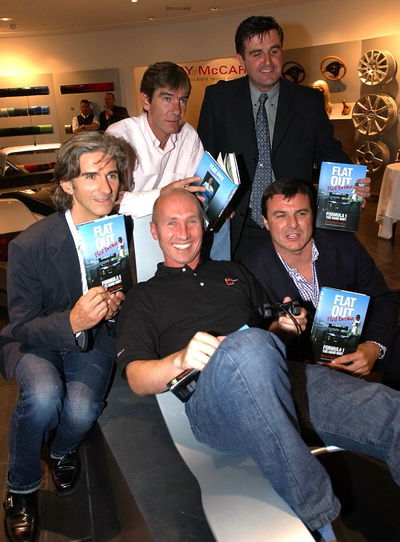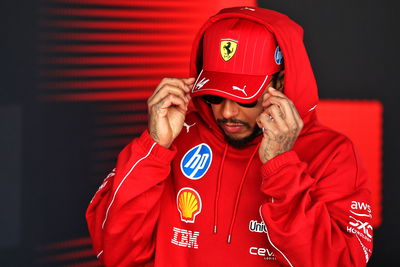Stewart: Tilke tracks to blame for lack of passing

Sir Jackie Stewart has called for more individuality among grand prix circuits in a bid to spice up the show, after several seasons where overtaking has been at a premium.
Still frustrated by Fernando Alonso's fruitless attempts to pass Vitaly Petrov and, potentially, go on to claim a third world title in Abu Dhabi late last season, Stewart has claimed that alterations to the most modern of circuits could help improve overtaking more simply than all the technological innovations - such as KERS and adjustable rear wings - being dreamed up and added to the current breed of F1 car.
"In my time, I have been a very keen golfer and, when I think of the great golf courses of the world - from St. Andrews to Pebble Beach to Augusta - they all have green fairways and they all have sandy bunkers," the Scot told Britain's Daily Telegraph newspaper. "Some suit the longer hitters; others place a premium on accuracy, but they each have their own unique characteristics. Crucially, no two of the ones I mentioned were designed by the same person.
"My belief is that the major reason for the lack of overtaking in modern grand prix racing is down to the modern tracks, nearly all of which have been designed by the same man, the German architect Hermann Tilke. I fear he has not done much for the spectators..."
While he praised Tilke for the general improvement in facilities at new venues, he called on the German - who was behind such tracks as Shanghai, Bahrain and Abu Dhabi - to consider making alterations to sections of his designs in order to facilitate overtaking at otherwise sanitised circuits.
"Racetracks have changed since my day - and thank God for that," noted the 71-year-old, a vociferous and highly pro-active advocate for better safety standards in F1 after seeing many of his friends and rivals killed in the 1960s and '70s. "Back then, a driver who raced for five years had a two in three chance of being killed, [and] four to six drivers a year lost their lives. It was totally unacceptable and I campaigned hard for improved safety in the sport, which happily came to pass. It is nearly 17 years since a life was lost in an F1 car, [and] I can't think of an industry, a sport or a business where that standard of risk management has been achieved.
"But we have now gone too far the other way. Circuits should not permit liberties to be abused without a penalty that can be instantly recognised by spectators or TV viewers. Safety is one thing; abuse of privilege is another.
"The new circuits themselves must take their share of the blame. Put simply, they are largely carbon copies of each other and they tend not to penalise mistakes. Take the last race of 2010 for example. There were four drivers who could have clinched the championship in Abu Dhabi, but Ferrari's Fernando Alonso was the overwhelming favourite. He had only to finish fourth to secure his third world crown, [but] it didn't happen because he could not find a way past Vitaly Petrov, a rookie in his first season in F1 and with little or no experience of being under such pressure."
Such was the ability to make a mistake and get away with it in Abu Dhabi, Stewart complains that, as well as finishing higher up the order, Alonso could just as easily have slipped back or gone out of the race altogether.
"Alonso ran wide at the Yas Marina track on four separate occasions as he tried to best the Renault and yet, incredibly, the car behind him, driven by Mark Webber, was still not able to pass," he sighed. "The run-off area was so well manicured and without obstacles that Alonso was effectively able to make fairly big mistakes and still maintain his position. That is plainly wrong."
Even though the FIA has allowed the use of KERS and adjustable rear wings in 2011, Stewart insists that there is a simpler solution to the age-old problem of little overtaking.
"Unless circuits are modified, spectators and television viewers might have to live with a lack of overtaking for some time," he ventured, "but I have another solution. What if Tilke simply modified the corners around his circuits in such a way that if a driver runs wide he is penalised? What if the surface of the run-off areas was changed so that a car's traction is reduced and a driver going wide loses ground either to the car he is following or allows the car chasing him to pass? Pretty simple really - and a lot cheaper than developing KERS.
"Making mistakes is something we all do. In most cases, we have to pay for those mistakes. We shouldn't die for them, but we surely should be penalised. This is what race fans the world over want to see; the best drivers in the world, in the most advanced cars, competing to become world champion. They should not be able to get there by getting away with making mistakes..."
Red Bull Racing star Webber, meanwhile, has echoed Stewart's remarks, writing simply on his Twitter page: 'Spot-on.'











